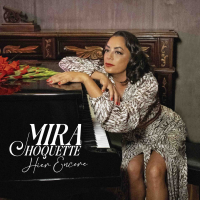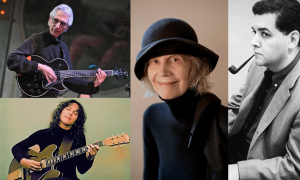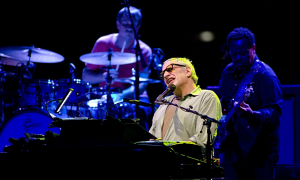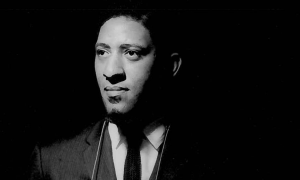Home » Jazz Articles » Highly Opinionated » Ornette Coleman: An Outsider Cracks the Egg
Ornette Coleman: An Outsider Cracks the Egg

In the late 1950's, Ornette Coleman brought an alternative approach powerful enough to challenge the entire pre-existing jazz paradigm.
There are two ways a musician can make a significant impact on jazz. One is to mobilize virtuosity and knowledge to push the current boundaries of the music. There are a number who fall in this category, but unassailable examples are

Louis Armstrong
trumpet and vocals1901 - 1971

Art Tatum
piano1909 - 1956

Charlie Parker
saxophone, alto1920 - 1955

Ornette Coleman
saxophone, alto1930 - 2015
Several branches had grown out of bebop in the 1950's-Cool, West Coast, Third Stream, Hard Bop, Latin and Brazilian-tinged jazz, but these were all closely related to the music created in the 1940's by Bird, Diz, Monk and cohorts. By way of example, in 1959,

Miles Davis
trumpet1926 - 1991

John Coltrane
saxophone1926 - 1967
There had been a few previous attempts to free jazz from swing and bop constraints. In the late 1940's,

Lennie Tristano
piano1919 - 1978

Cecil Taylor
piano1929 - 2018

Sun Ra
piano1914 - 1993
Jazz musicians had historically used a small list of criteria to evaluate whether a particular musician was worthy of attention, the most important being: can the player "cut the changes" in tunes like "Cherokee" or Coltrane's "Giant Steps"? Some value was also given to music writing and/or reading skills. One can characterize both of these criteria as more "professional" than aesthetic. On the other hand, a more ineffable quality was also important-having an individual "sound"-a combination of the tone and the notes identifiable as your own.
Ra had performed as pianist with

Fletcher Henderson
arranger1897 - 1952
The record is pretty clear about Coleman's technical strengths and limitations. He'd started R&B gigging when he was 16, moved around the sax with facility and had a strong, personal sound. Harmonically, he was limited. As outlined by Maria Golia in her biography and from first-hand testimony told me by a friend who played with Coleman, it's clear that he could not play mainstream chord-centric jazz. Throughout his life there are examples of Coleman being booted out of jam sessions by musicians who didn't think he knew what he was doing. So, in the context of the technical "chops" standard of judgment, it's easy to understand why, in the wake of Coleman's 1959 debut at the Five Spot CafЁҰ, Miles Davis,

Max Roach
drums1925 - 2007

Charles Mingus
bass, acoustic1922 - 1979

Roy Eldridge
trumpet1911 - 1989
At the same time, there were others who saw in him a unique and powerful voice-who weren't concerned with what he couldn't play, only with what he did. Such had been the case from his teen years, when other musicians were eager to work with Coleman, even when their own high level of skill could have gotten them other kinds of gigs. Ornette met many of these musicians early on and continued to work with them the rest of his life.
Why did Coleman become the focus of so much attention, rather than Cecil Taylor? I think that one reason so much energy was generated around his appearance is that Cecil Taylor played piano and at this point, wasn't working with horns, while Ornette played sax and had another horn in his quartet (pocket trumpet). Horns are, bluntly put, "in your face" and large deviations from horn-playing norms tend to provoke a visceral response. Second, Ornette was all about the emotion and at that point, Cecil's playing was more about the head. Taylor had been influenced by classical music and his dense chromaticism and rhythmic displacements were challenging. The dissonance in Coleman's music was less jarring-more a result of subtle byplay between the rhythm section and the horns than present in the solos of the horns themselves.
Although Coleman was smitten by bop as a young man, he never mastered it. One might say this left him free to develop a more emotional mode of expression of the sort that he'd witnessed in church and in the various dives he'd played. The music was direct-the blues was a clear element in the vocabulary. One might say that rather than using chords to guide the process of tension and relief, he created bands where the musicians looked to each other to do it. Finally, Coleman's melodies were not hard to like-accessible, dance-like, logical and sometimes, quite sad.
In a broad sense, one might say that although Coleman jettisoned some traditional jazz underpinnings-primarily harmonic but to some degree also melodic and rhythmic, his music continued to operate in what I would call a "zone of emotion" that was familiar to jazz listeners. Those not put off by his rejection of those trappings could hear and understand the "story" he was telling.
The final, ineluctable quality that Coleman brought to the table was that he had an individual "voice"-the sine qua non and preeminent ethos in jazz. The pleading, brash, sometimes squabbling, sometimes stentorian sound of his alto sax was immediately recognizable. Had he diluted his voice by straining to do something he could not, he would have kicked the pillars out from the edifice he built.
I would not pass a litmus test as a true believer. I'm most enamored of his early acoustic quartets with the likes of

Don Cherry
trumpet1936 - 1995

Charlie Haden
bass, acoustic1937 - 2014

Billy Higgins
drums1936 - 2001

Ed Blackwell
drums1929 - 1992
Ornette was the right man at the right time. His outlier status as a Texan was anything but a hindrance, while his idiosyncratic "look" seemed to strike a chord. In some ways, he was the beneficiary of the groundwork laid down by other boundary-breaking musicians and of the shift in thinking generated by Abstract Expressionism, non-narrative filmmaking, Beat culture and increasing interest in Eastern thought. The ground had been seeded, but the vortex that was Ornette created a vacuum and many walls collapsed.
More than just a temporal effect, however, sixty or so years later, his work still has the power to shake, amuse and stir us. In many ways, Coleman was not a sophisticated or educated man, but would any of us trade some of ours for a little bit of Ornette's creativity and strength of purpose? I think so.
Tags
Highly Opinionated
Steve Provizer
Louis Armstrong
Art Tatum
Charlie Parker
Ornette Coleman
Miles Davis
John Coltrane
Fletcher Henderson
Maria Golia
Max Roach
Charles Mingus
Roy Eldridge
Don Cherry
Charlie Haden
Billy Higgins
Ed Blackwell
Comments
PREVIOUS / NEXT
Support All About Jazz
 All About Jazz has been a pillar of jazz since 1995, championing it as an art form and, more importantly, supporting the musicians who make it. Our enduring commitment has made "AAJ" one of the most culturally important websites of its kind, read by hundreds of thousands of fans, musicians and industry figures every month.
All About Jazz has been a pillar of jazz since 1995, championing it as an art form and, more importantly, supporting the musicians who make it. Our enduring commitment has made "AAJ" one of the most culturally important websites of its kind, read by hundreds of thousands of fans, musicians and industry figures every month.

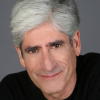



 Buy Now
Buy Now



